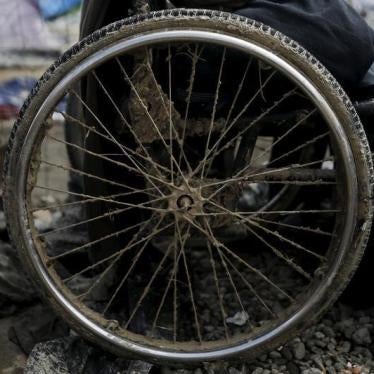Throughout the World Humanitarian Summit in Istanbul this week, United Nations and government officials, humanitarian actors and nongovernmental groups uttered a constant refrain: Leave no one behind.
I watched UN Secretary-General Ban Ki-Moon preside over the adoption of what he called the “groundbreaking” Charter on the Inclusion of Persons with Disabilities in Humanitarian Action. Flanked by leaders in the disability movement, he praised their courage and perseverance in the face of conflicts and disasters, and acknowledged that people with disabilities are often overlooked in the humanitarian response. He emphasized the importance of non-discrimination in accessing basic needs such as food, water and health care.
At a different session, a representative of the International Committee of the Red Cross (ICRC) candidly said that humanitarian actors can do more to help people with disabilities. “If we want to remain true to our commitment to impartiality, which is one of the fundamentals of humanitarian work, we need to do much more to reach out to [people with disabilities]…since they are often less visible,” he remarked. At another panel, the head of Oxfam made a similar point.
But was this all just rhetoric? Empty promises of inclusion, participation and partnership?
Time will tell, but I came away from the summit with a sense of hope and urgency.
Hope because humanitarian actors are acknowledging that people with disabilities have been overlooked and that this needs to change. People with disabilities are now on the radar.
Urgency because, with civilians fleeing Falluja, Iraq and residents left homeless by the earthquake in Nepal and so many other crises around the world, people with disabilities are grave risk.
Aid workers are often overwhelmed with competing priorities in crises, but inclusion doesn’t have to be costly or complex. And the best way to find out how to assist people with disabilities is to ask them directly: by developing partnerships with organizations of persons with disabilities well in advance of a crisis or having people with disabilities serve on decision-making bodies, such as camp management committees. These steps don’t cost much, if anything.
People with disabilities also need more information in easy-to-understand formats, such as how to evacuate dangerous areas and where to seek aid. And key to reform is collecting data on people with disabilities. If you are not counted, you simply don’t count; programs and funding priorities will ignore your needs.
UN agencies, governments and humanitarian organizations heard these recommendations throughout the two-day summit, particularly from people with disabilities themselves. The question remains: were they heard?
“Leave no one behind” should be more than just a mantra.









